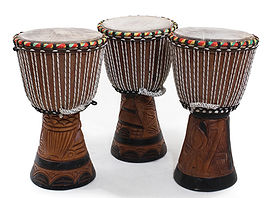

Jembe Drumming for Healing
BEGINNING
The West African Jembe drum first gained popularity in North America (and then world wide) through Nigerian master drummer Babatunde Olatunji. Influential on various artists in the music scene beginning in the 1960s, he generously shared enthusiasm for the complexity of African rhythms.
Since then another big influence has been Arthur Hull, who is widely credited with originating the technology of the facilitated drum circle, where participants find their own rhythm and organically work together (orchestrated by the facilitator) to play together.
Our work in this course will be neither a strict adherence to traditional rhythms (though they will definitely be part of the disciplined source of our learning) or the unbound free range of the drum circle. Rather, we are following the ubiquitous foundation of ritual rhythms found throughout Africa and the diaspora. This the polyrhythm which is recognizable as an interplay between 4/4 time and 6/8 timing.
As taught by master ritualists Malidoma and Sobonfu Somé, ritual is a "technology of community." In that context, the skill and persistence of the drummers and singers is a major contributor to the creation of a container which temporarily opens a bridge of communication between the human and the other-than-human members of community (nature, ancestors and spirit).
"Known and Unknown, and
in between,
the Doors of Perception"
Aldous Huxley

The spelling Jembe is preferred now by some as preferable to the French influenced spelling "Djembe"

One example of the many notations that have been developed for the Jembe
PREPARE
There is much research now that shows the health benefits of group drumming. The skill of the Jembe is partly developing more connection between different sides of the brain. The companionship of others in the presence of music making improves mental health.
One of my African dance teachers said "If you can smile while you are dancing, you are a professional African dancer!" This spirit of inclusion was echoed by one of the African master drummers Mamadi Keïta told my teacher "Russell, Africans don't own these rhythms, we are just holding them for everyone."
It is a time when we need healing traditions, and the Jembe has been one of the traditions clearly shared for anyone to learn who feels moved by the rhythm.
It is also said: "If you can walk, you can dance, if you can talk you can sing, and if you can clap you can drum." You are welcome into the world of drumming, just the way you are.

Professional or Personal Development
Drumming ensemble work is extremely rich with metaphors about leadership and teamwork, and these will be explored naturally within the context of the learning and playing gathering times.
Who is this relevant for?
-
Anyone with an interest in exploring rhythm
-
Performers and Artists including Storytellers, Poets, Actors and Dancers
-
Facilitators such as Ritualists, Leaders, Activists and Environmental Educators
-
Healers like ReWilders, Therapists, and others involved in Healthcare
Facilitator
Randy Jones is author of "Medicine Without an Expiry Date: Indigenous Remedy for Modern Trouble," introduced by Dagara [Ancestor] Elder and Diviner, Malidoma Somé, PhD. He has been drumming for 20 years and led African grief rituals as shared by Dagara Elders (Ancestors) Malidoma and Sobonfu Somé.
Practicalities tickets and times
Tickets through Humanitix—Choose your own tuition:
Full Tuition: $255
Partial Scholarship Rate: $225
Scholarship Rate: $195
Please arrive 5 minutes before class for a prompt start.
Six Monday evenings Nov Dec 2025
Also continuance in 2026 after Christmas break
7:00 to 9:00pm
Nov 10
Nov 17
Nov 24
Dec 1
Dec 8
Dec 15